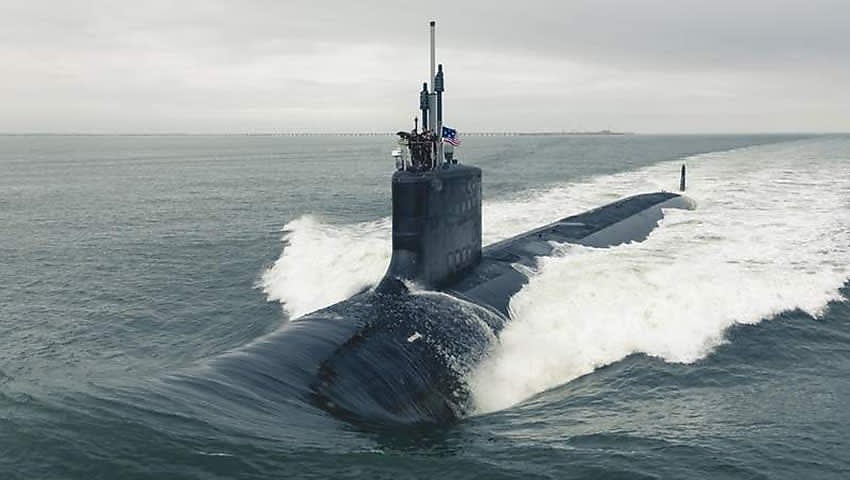Opinion: RAN veteran and defence analyst Christopher Skinner explains how Australia can shore up its sustainment capability before proceeding with major defence acquisitions.
To continue reading the rest of this article, please log in.
Create free account to get unlimited news articles and more!
The United States Naval Commander of Virginia Class nuclear attack submarines (SSN), an option under consideration for Australia’s AUKUS program, recently was reported as unhappy with the number of operational Virginia SSNs that were in maintenance and therefore unavailable for operations.
The cause, he explained, was lack of necessary materials and replacement spare parts, as was agreed by the Submarine Program Executive Manager within the US Naval Sea Systems Command.
One of the modern approaches to replacement subassemblies and subsystems is what are termed “rotable pool” items that are purchased in excess of the numbers needed for the submarine construction so that when a unit is removed during maintenance, it can be refurbished, requalified and be ready on the shelf for immediate installation in the next submarine that requires it.
The idea is to reduce downtime for the submarine while the repair work is proceeding without holding up the maintenance availability.
So, what has that got to do with Australian industry capability, you may ask. The point is that Australian industry needs to shift its focus from trying to persuade prime contractors from overseas to shift to local industry when they are less well known and may incur start-up costs that don’t apply to the existing offshore supplier and likely higher costs of labour and materials in many cases, plus the uncertainty over quality and capacity.
Instead, Australian small and medium enterprise (SME) companies should examine closely the sustainment planning for each major program and identify where there is risk of program shortcomings due to lack of materials and subassemblies when needed for regular scheduled and unscheduled maintenance.
This analysis ideally should be led by Defence Capability Acquisition and Sustainment Group (CASG) but with the important difference to involve Australian industry analysts and advocates from the start so the critical sustainment industrial functions and components can be assessed without that being filtered through the bidding prime contractors’ current supplier preferences.
I am a great fan of the Australian Industry & Defence Network (AIDN), the peak body for SME advocacy, but their hands are tied to follow my proposed approach because they are limited to the following three strategic directions, all of which are laudable but rely on the goodwill of CASG and of the prime contractors:
- Advocacy: by providing a “voice” for SME issues and concerns.
- Representation: AIDN provides leadership and builds and maintains key partnerships at local, national and international level, through influencing national policy and strategy and maintaining key relationships with political and government decision-makers.
- Member services: AIDN services its chapters and their members through providing relevant information and awareness on the defence and security environments, opportunities for collaboration and engagement and governance oversight.
The additional element of the proposed Australian industry policy is for the CASG customer to work on behalf of the SMEs to negotiate SME participation in the logistic support analysis for the new capability program right from day one. By all means, work with or through AIDN, but the main point is that the appropriate SMEs are at the negotiating table as supporters of CASG from the first day of contract negotiations and the intention for this to occur is plainly stated in the requests for proposals and tenders.
This approach will undoubtedly be opposed by prime contractors but that should not dissuade CASG as the customer from taking a whole of life approach to the capability and making an objective assessment of the risk of a similar predicament to that reported for the Virginia Class SSNs.
There will need to be a rigorous assessment of how best to include this approach in the requests for proposal and other acquisition contracting documentation, but that should not be too difficult.
The bottom line is the leverage that will exist at the initial stage of contractor selection that they must have agreed to release the necessary intellectual property rights and technical information to an approved Australian SME subject to CASG acceptance of liability should this fall over or become uneconomic.
The end result then would be involved SMEs’ manufacturing and refurbishing rotable pool and other major components and assemblies for the new Australian capability such that there was a local, Australian-run supply chain that might even graduate to offshore export for other operators of the same or similar capabilities.
Cristopher Skinner served 30 years in the Royal Australian Navy as a Weapons and Electrical Engineering Officer in six surface warships, in the South-East Asian Treaty Organisation, the Vietnam War and surveillance of the North-West Indian Ocean. In two of these ships he was the action Weapons Control Officer for ASMD and AAW watchkeeper for area air defence dealing with engagement decisions in real time. Shore service included secondment to the Defence Research Centre, Salisbury and to the US Naval Sea Systems Command to manage the lead-ship trials for a joint frigate project, Superintendent of Missile and torpedo Maintenance, and the initial project director for the ANZAC frigate program of 10 ships for Australia and New Zealand. He is a member of several naval and geopolitical institutes, but the opinions expressed here are his own.

 Login
Login







